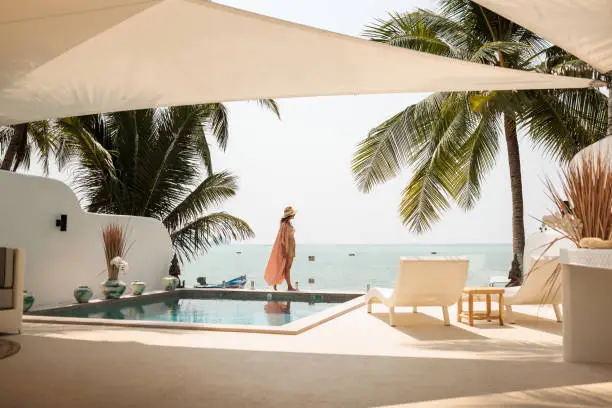Even when the market is unsure because of an economy and requires a shift, there still is a trend with a considerably high level of resistance: less expensive travels that look like luxury experiences. Lately, rich people are still the ones who can afford to use air taxi services, go sunbathing at exclusive hotels, or spend their holidays in the Mediterranean on a yacht; they, among the other affluent tourists, are the ones who are gently pulling the economy out of the quagmire. The recovery in travel from the COVID-19 epidemic is not only a positive sign for the travel industry, but it is also to the benefit of the economy in general. These high-elite individuals are showing their generosity spontaneously through large expenditures for activities that they can enjoy only once; they become the engine of the economy with the easiest-spotted effects, namely the spending, job creation, and confidence in a variety of sectors that they generate.
Luxury Travel and Its Influence on the Economy
Convenience is not the only thing luxury travel offers because it also significantly impacts a place’s economy. Travelers who belong to the higher income group tend to be more lavish when it comes to their spending on things like flights, accommodations, dining, entertainment, and customer impact services. This money trickles down the whole economy, from airline bookings and luxury hotels to gourmet food suppliers and boutique experience designers. From there, each deal brings new dollars into the system, creates new jobs, and pays taxes that stimulate the hotel industry and the hospitality-based GDP.
Luxury travelers play an essential role in local communities by benefiting their economies. People who belong to the global traveling team of the elite choose to continue to spend more and more. Besides that, they are not mean to their waiter, whose smiles and courtesy they have thus rewarded. They go to do as many activities as possible for themselves. It was unsurprising to find businesses that targeted these customers, creating extensive treatments to meet the growing demand, hiring more qualified staff, and inventing customer experience.
Who Is Leading the Charge?
The extraordinary growth of lavish tourism expenditures is primarily facilitated by those households that receive over $250,000 annually. As per the Moody’s Analytics study, these households contribute to approximately half of personal consumption expenditures in the U.S. and around a third of GDP. The upswing in the stock market and high housing values have prompted wealthy consumers to buy regular items they purchase, leisure products, and top-tier experiences.
This is evident in the fact that the platforms and agencies catering to the economics of high-net-worth individuals have disclosed that there has been a massive surge in the value of reservations. To mention the impact, The Thinking Traveller, a top-class villa rental company, reported an astronomical increase in the average booking values from $3,000 to $20,000 per night.
High Demand for Global Luxury Escapes
One of the salient signs of the strength of luxury travel is the constant attraction to overseas destinations. Deloitte’s ConsumerSignals study finds that as many as 75% of affluent consumers plan to make a hotel reservation in the next three months, with 45% considering booking flights abroad. Only 31% of ordinary customers plan to fly, and the gap becomes more expansive.
While seeing some reduction in the budget brands, Hyatt confirms the surge of the luxury segment. The sharpest rise is observed in upscale areas throughout Asia, Europe, and the most remote islands. These escapes are not simply a matter of a couple of days’ relaxation but are planned in a luxurious and designed manner.
The Psychology of Premium Spending
What is the main reason that the well-off are willing to continue the luxury travel experience despite the exorbitant expense? Most believe that travel is an emotional escape and an investment in life. The very reason it appeals to travelers is not only in the place they go to but also in their experience of comfort, exclusivity, and personal fulfillment. The distinction between travel, a luxury good in economics, and, consequently, the uniqueness of the matter is because it is not only a product but also a symbol of reference, satisfaction, and success.
Moreover, wealthy people generally take travel as part of their identity. Because of this, the luxury market no longer focuses solely on products. Instead, it has created experiences that meet the consumer’s needs in today’s world. The appearance of new needs is the starting point for the whole, and the consumer-oriented luxury strategy decides it, emphasizing the importance of branding based on emotion, uniqueness, and storytelling in luxury.
Booking Trends Tell the Story
Agencies like Scott Dunn and networks such as Virtuoso confirm the numbers already denoted by their record. Virtuoso promoted a 57% increase in bookings with sums higher than $50,000 and an 81% surge in those greater than $150,000. The big-ticket premium services, such as exotic jets, the only yacht at sea, and personalized schedules, are still in high demand.
Besides, North America is not the only sector experiencing exponential growth. The offices in Europe and Asia also logged a boom. One example is that Singapore-based customers are now embarking on more long-distance journeys from one continent to another. These changes support the development of the luxury tourist industry, which is becoming more personalized and shifting from mass-market tourism to travel.
The Multiplier Effect on Supporting Industries
Each luxury booking can benefit tens of industries. It is about the exclusivity of their services and the inclusive way the money is spread around, from private chauffeurs and Michelin star chefs to local artists and adventure guides. The influence of luxury goes through other areas, such as luxury retail, wellness services, and real estate. Luxury accommodations are getting more significant, airplanes are changing fleets, and travel and tourism management are reshaping advertising strategies to attract the elite of the elite.
Furthermore, the customers of the top-premium tier usually purchase tickets for their trips months in advance. Such super light travel characteristics are the ones that, in turn, get workers back on a seasonal basis, generate work for local staff throughout the year, and revitalize deserted off-season places. Thus, prosperity spreads through grand jet-setters as the primary source.
Macroeconomic Factors Supporting the Trend
The macroeconomic data that are currently available confirm the strong willingness of rich people to travel more lavishly. Although there are some global issues and a slight hint of inflation, millionaires are more resistant. Indeed, the Bank of America Institute’s report shows that high-income workers’ after-tax pay had risen by 3.5% in the first half of 2025, while people experiencing poverty had only managed to secure a 2.4% advance.
This rise in leftover money and soaring asset prices has created a perfect base for the explosion of luxury consumption. With the bulk of the financial burden removed, the consumer segment is shifting its attention to high quality and different. The majority of today’s investors support being a tool for happiness and reconnection, a noticeable feature of post-pandemic depression empowerment.
Temporary Headwinds and Resilient Demand
Even though luxury travel is exploding, some data from the beginning of 2025 outlines that there were temporary breaks. The cruise giant Viking Holdings stated that they had a slump in February. However, they still secured $2.6 billion in advance river cruise bookings. This is a 24% increase from the previous year. Similarly, Abercrombie & Kent saw a more tranquil beginning of choice as travelers’ bookings increased, demonstrating the continuation of high-value experiences.
Their patience among the affluent is proof of prudent spending habits. Group travel was replaced with single travel, and many short hops were taken rather than flights or postponed in full. Their plan budgets are still lenient, and the providers seem confident about future bookings. They are comfortable with takeaways they are familiar with.
Luxury Travel Is Becoming More Purpose-Driven
The latest noteworthy trend in the affluent market is a tendency toward luxury travel with a deep sense of purpose. The relatively wealthier segment of travelers strongly prefers experiences with a very low environmental impact, such as cultural immersion, heritage exploration, wellness journeys, and nature conservation.
Thus, this is a clear manifestation of a new cohort of travelers who adhere to the principles of Thrive Travel, which signifies personal growth and ethical tourism. In the majority, such experiences are luxurious and add substantial revenue to the local and global economy, thus enriching local and international communities. Let’s not forget that clientele these days require not just pampering but also would like to be part of stories worth sharing and lives that touch.
Digital Influence and Premium Tech Adoption
Digital devices have done wonders for the rich who travel in the luxury segment, as they have redefined how travel and luxury operators engage with one another and how travel is undertaken. Firms in the luxury travel industry use modern technology to create unique and highly customized customer experiences, simplify the journey, and enhance customer service with instant responses.
Social media plays a significant role in that as well. The emergence of Influencers and content creators has given a new meaning to aspirational travel. A single travel image published online – whether a private jet or a beautiful eco-resort on the beach – can trigger the conversion of desire into actual bookings.
High-End Travel in the Future
Luxury travel is expected to continue growing in the future. With new markets like India, Southeast Asia, and Africa bringing about additional ultra-high-net-worth individuals, the demand for luxury travel products will be even more diverse globally.
Repetition will gain even more importance in the future. Companies in the tourism sector that recognize the delicate taste of their wealthy customers will succeed significantly. Be it
AI-planned excursions, sustainability-focused events, or intergenerational rest areas, the demand for luxury travel is healthy and increasing.
With the growth of this sector, local governments and tourist brand companies could also consider revisiting visa policies, adopting infrastructure ventures, and offering incentives to attract high-paying tourists.
In Conclusion, Prospects for the Global Economy
To reiterate, luxury travel on the side of the supply of the spectrum sparks economic development beyond the trend of being ostentatious. The ripple effects are wide-ranging, touching many sectors, from airlines and hotels to local artisans and multinational brands.
Luxury travel represents endurance, positioning high, and transformation. The escapade has become a needed asset for many upper-end consumer groups, although temporary geopolitical, environmental, or social adverse effects occur. In any case, the dominant trend is more of a positive one.
A luxury trip gives hope in a world economy with a continuous chain of connections between entities, where the markets move according to the customer’s mood. It also shows that there is money in the family, which is the basis for job creation and inspires new business sectors. Ultimately, it is the only condition to go on the world tour that travelers can use as a springboard for development and growth.
That’s why economic travel stays a definite cornerstone of current vibrant economic landscapes—they are essential at the beginning, middle, and end.

